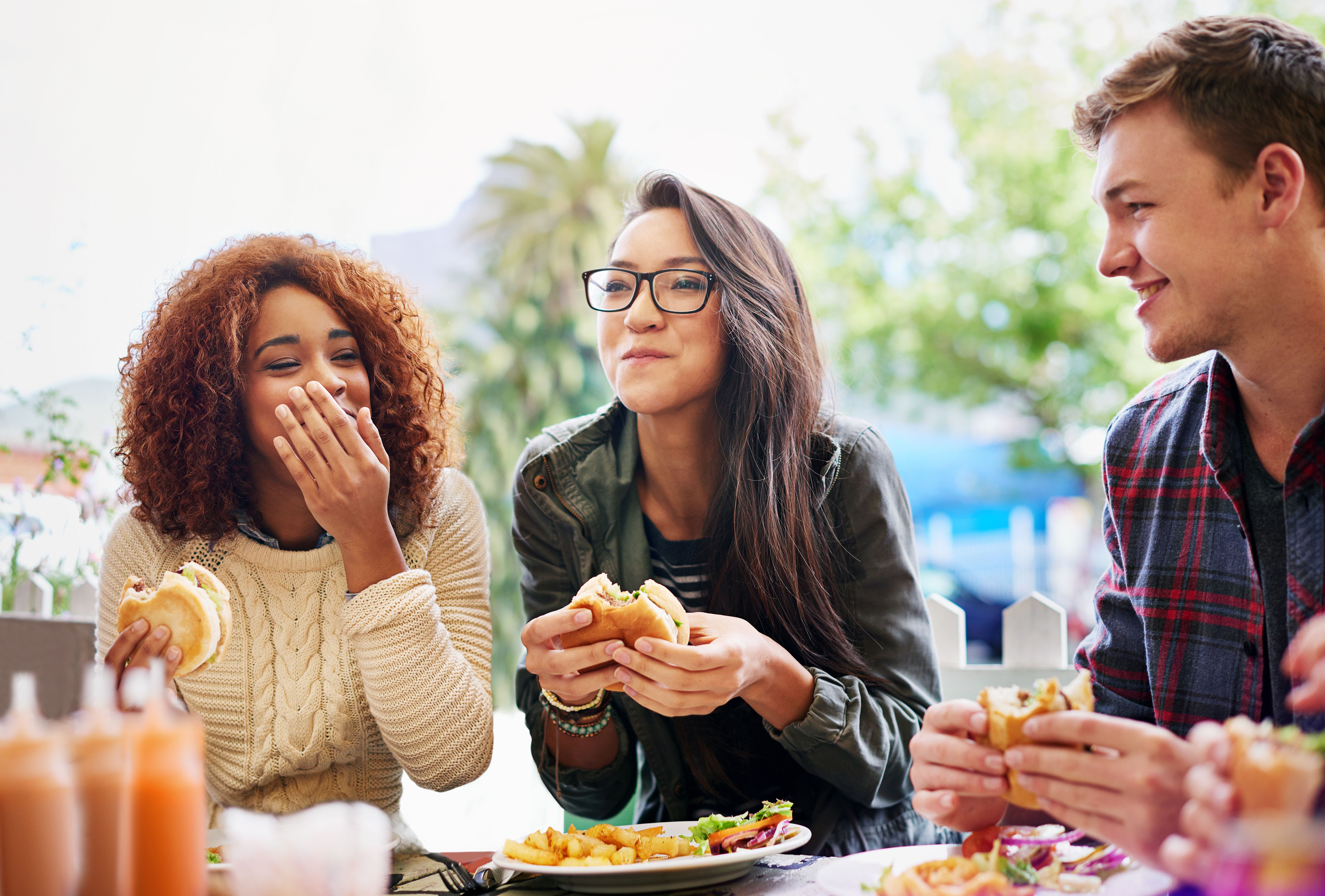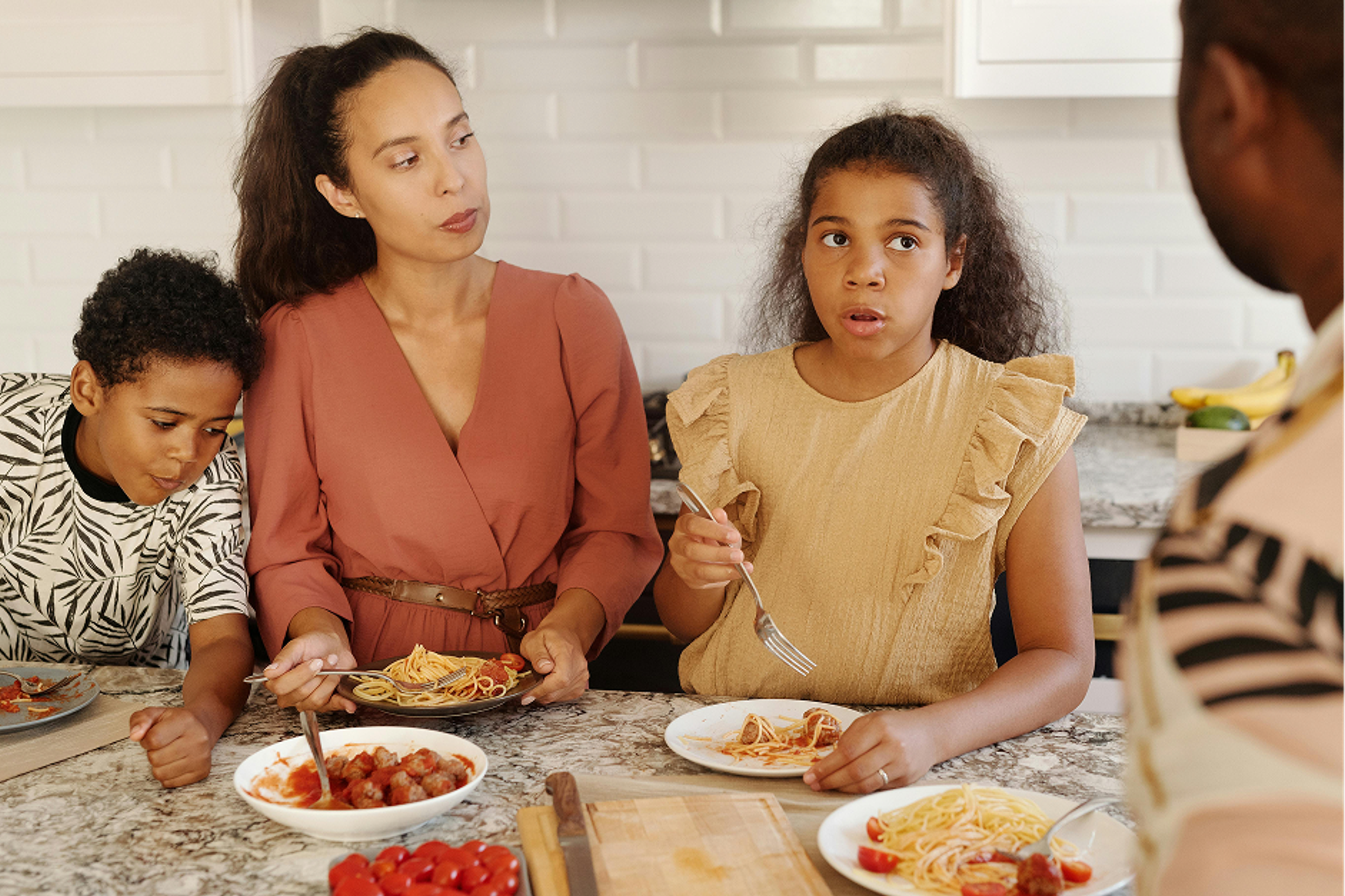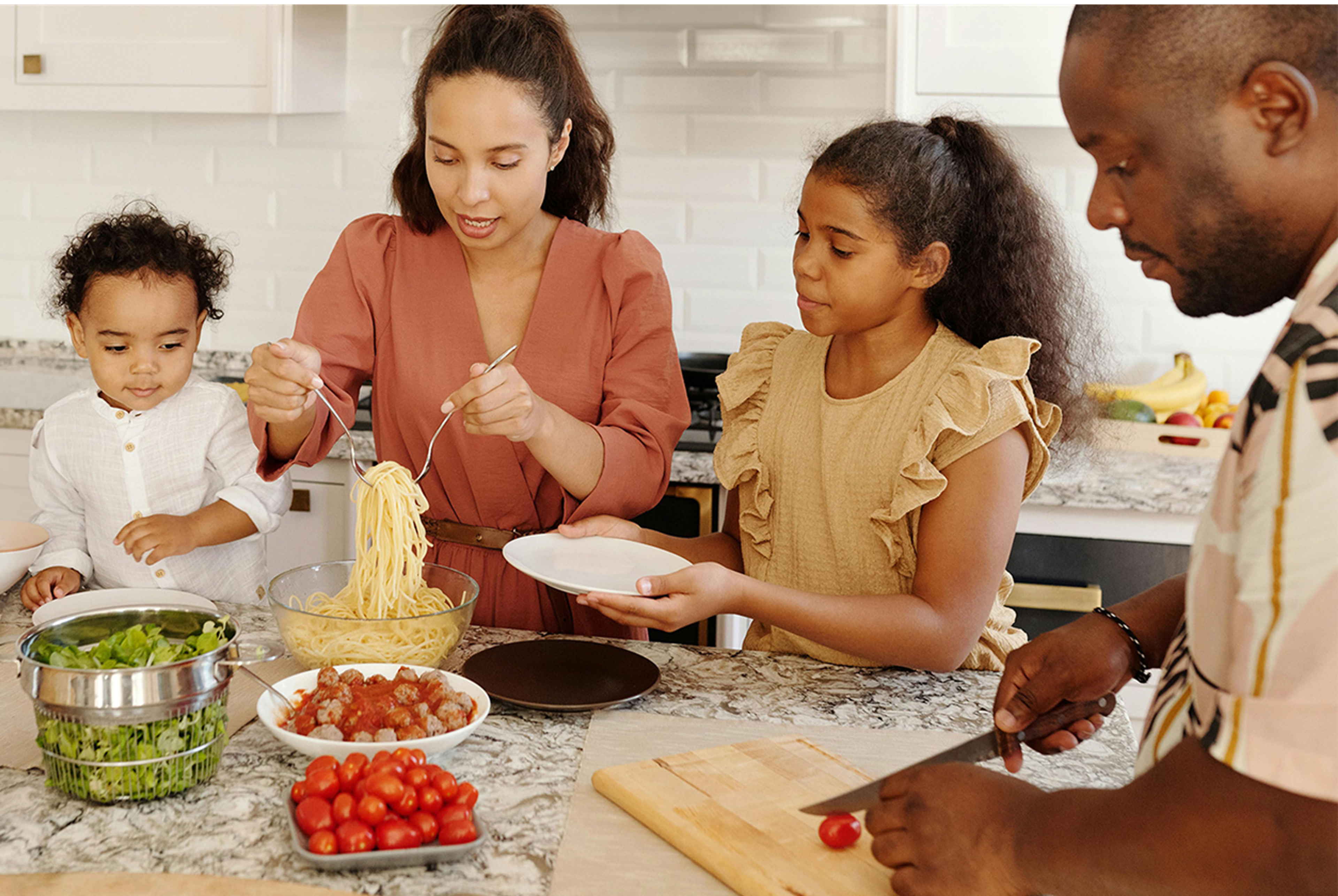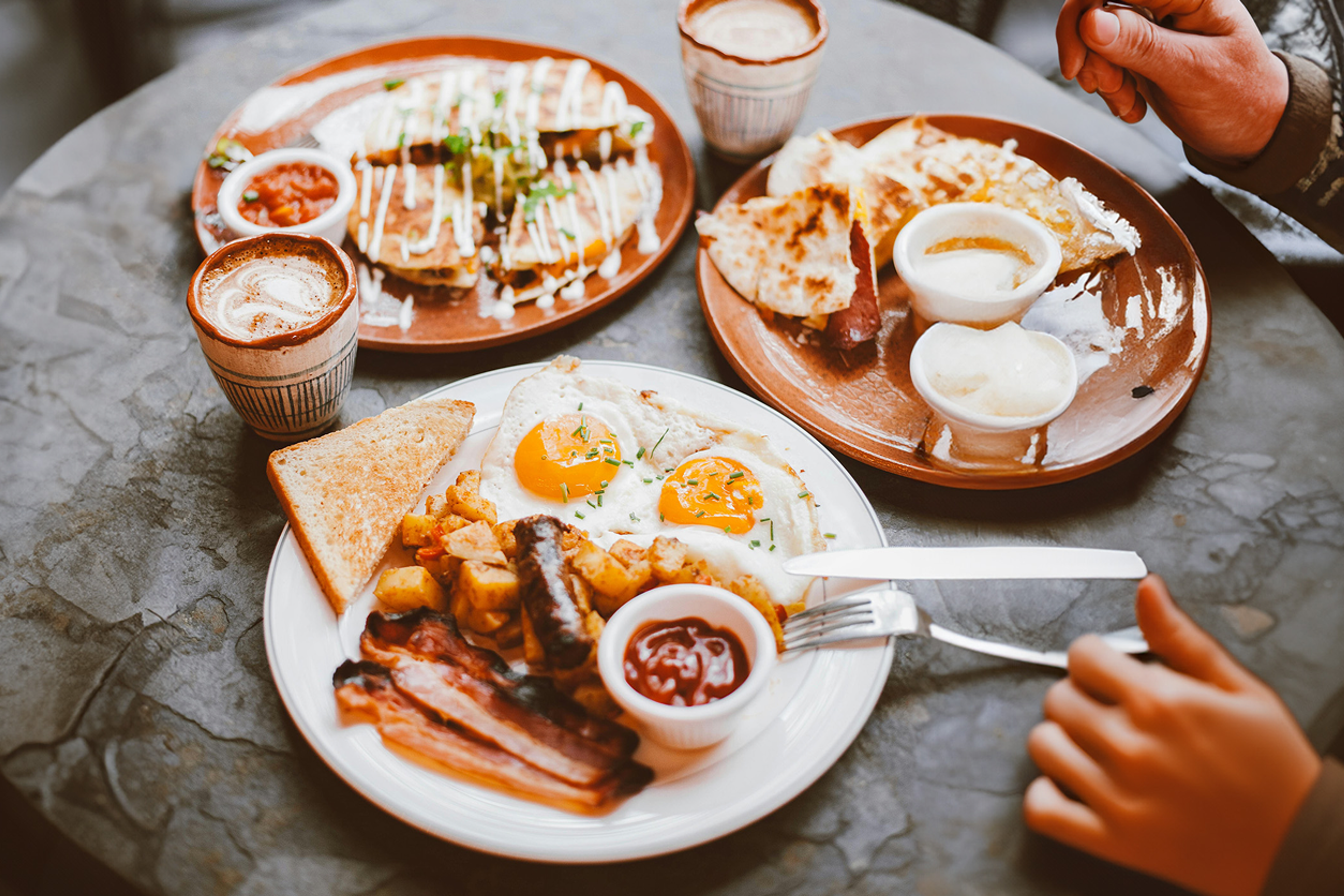


Equip Lead Peer Mentor Makailah (Mak) Dowell says that emotional eating ruled her life for over a decade. “Emotional eating is when you eat to fulfill an emotional need, and these emotional needs are usually very big,” she says. “For me, it was an answer to the bullying I faced and to inconsistency in my life.”
Eating as a response to strong emotions isn’t a problem in and of itself (in fact, emotional eating is considered a normal coping mechanism for intense feelings) but in some cases, it may indicate a deeper issue. Read on to learn more about the relationship between eating and emotions, when emotional eating might be considered a problem, alternative coping strategies, and when to seek help.
What is emotional eating?
Almost all of us have eaten emotionally at one time or another. Maybe you’ve tried to remedy the boredom of an all-night study session with a big bag of chips, or found yourself hitting the bottom of a box of cookies after a particularly sad day, or had so much fun with friends that your full stomach didn’t stop you from consuming the better part of a pizza. In all these cases and more, your emotions, rather than your hunger cues, may have driven you to consume food. It can even feel like a "food obsession."
“Emotional eating occurs when we eat in response to emotions or unmet needs rather than biological hunger,” says registered dietitian nutritionist Briana Mancha of As You Are Nutrition. “It's easy to confuse emotional hunger with biological hunger. One of the differences is in the underlying intention for eating.”
Equip Therapist Lead Jonathan Levine, LCSW, points out that emotional hunger is just as “normal” as its biological counterpart. “I think of emotional eating as eating for any reason other than hunger or nutritional need,” he says. “Food plays so much of a role in our lives and only one of those roles is nutrition or energy—we all emotionally eat all of the time and it's often fantastic!”
While emotional eating is often associated with binge eating, the two aren’t necessarily connected. For some people, consuming food in response to positive or negative emotions is just a way to manage intense feelings, and doesn’t lead to a binge or binge-like behavior. In many cases, emotional eating is nothing more than its textbook definition: “the propensity to eat in response to positive and negative emotions.” While this may lead to increased food intake or eating past fullness, is emotional eating really a problem?
The potential risks of emotional eating
While emotional eating can sometimes lead to binge eating (more on that below) and distressing feelings like guilt or remorse, many eating disorder experts say that, in the absence of other symptoms, emotional eating itself isn’t risky or disordered.
“There aren't any real mental or physical risks to emotional eating,” Levine says. “Sure, you may get a little extra bloated or gassy from eating past fullness, but that will pass in time. Mentally, maybe you get some brain fog from the added digestion but realistically that's going to pass barring any extreme circumstances.”
Levine believes that any perceived “risks” of emotional eating are rooted in our society’s inherent anti-fat bias and idealization of thinness. “The ‘risks’ of emotional eating are primarily tied to diet culture, or the overvaluation of thinness coupled with the belief that fat is bad,” he says. “This vilification of emotional eating is really connected to the belief that weight gain is innately dangerous (it's not).”
As Dowell sees it, emotional eating is neither good nor bad—it’s simply a behavior. “As a society, we love to think in black and white about topics that are more nuanced than that,” she says. “Emotional eating can be an answer, a resource, a pain point, a response, a support, or an enemy. Emotional eating does come with side effects, such as the risk of developing disordered eating behaviors, gastric pain, and comorbid mental health diagnoses. That being said, it can also come with positive side effects, like relief, nourishment, and self-compassion. Again, it is not as black and white as you might think.”
Mancha also views emotional eating as a normal and valid way to cope with emotions, but believes it’s important to remain aware and curious about what’s driving the desire to eat. “While emotional eating isn’t inherently harmful, relying on it as your sole coping mechanism can lead to a cycle of guilt, shame, and an unhealthy relationship with food,” she says.
Because emotional eating can serve so many different needs and present in so many different ways, Dowell says it’s critical to view it as a neutral behavior worthy of inquiry. “That is why we don’t shame ourselves when we eat emotionally—we reflect,” she says. “We try to gain an understanding of a behavior that we are engaging in. This allows us space to stop, have autonomy, and be kind to ourselves.”
Are there any benefits of emotional eating?
If you do a Google search for “emotional eating,” it almost exclusively turn up articles on the supposed dangers associated with the behavior and strategies to stop it. But in reality, emotional eating isn’t something that needs to be universally avoided; under certain circumstances, it can actually serve an important purpose, and condemning it entirely isn’t helpful or productive.
“Absolutely there are benefits to emotional eating!” Levine says. “Eating can be an act of pleasure, of connection and community building, of nostalgia for past times in our lives. It can be one of the main ways we cultivate joy. There is so much more to eating than meeting nutritional needs, and while we as a society know that, we often like to pretend it's not true. Normalize eating for pleasure!”
While many of us think of emotional eating as a reactionary answer to stress or bad news, it can also provide joy and hope. In Dowell’s case, food served as a source of security and community, which had both been missing at times in her life. As someone who comes from a background of food insecurity and being houseless, food was a sort of sanctuary: “For me, emotional eating allowed for safety, comfort, and connection in response to accessible food,” she says.
Mancha also points out that food can be nostalgic, letting people reconnect with happy moments from the past. “For instance, familiar flavors or meals from childhood can allow pleasant memories,” she says. “Eating itself can offer temporary relief, grounding, and distraction during stressful times, which is not always a bad thing. It's important to acknowledge and honor emotional eating, while also building awareness of emotions and developing additional coping skills.”
Is emotional eating an eating disorder?
Given the flood of messages we receive via diet culture that “food is fuel” and should only be consumed as a source of energy, it’s understandable that many people view emotional eating as wrong or even disordered. So is emotional eating an eating disorder? “No—hard no,” Levine says. “Eating is human. Seeking joy, respite, connection, community, and even sometimes numbing with food, are all parts of the human experience and have been for a long time.”
Dowell agrees, and believes labeling emotional eating as “disordered” can do more harm than good. “If emotional eating is a moment and not a disordered pattern of behavior, then we should not label the moment,” she says. “We should not shame it or doubt it, or discredit the fact that for someone, it may be a form of healing.”
If emotional eating does become a consistent pattern of behavior, however, it may be time to reach out for help or guidance. “Emotional eating on its own shouldn't be classified as an eating disorder, as it's a common behavior many people experience,” Mancha says. “However, if it begins to interfere with daily life or contributes to disordered eating patterns, that may require support.”
Emotional eating vs. binge eating
While some people equate emotional eating with binge eating, Levine says they are distinct from one another; people with binge eating disorder may eat emotionally, but emotional eating itself doesn’t indicate BED. Levine recommends that people only seek help for emotional eating if the behavior is causing them distress or if their eating habits are beginning to mirror the symptoms of binge eating.
Because both emotional eating and binge eating may originate from the drive to fill an unmet emotional need, it can sometimes be difficult to differentiate between the two. But generally speaking, binge eating disorder is also accompanied by other signs and symptoms, like:
- Stealing or hoarding food
- Eating in secret/avoiding eating with others
- Periods of intense food restriction (before and/or after binges)
- Social withdrawal
- Feeling a loss of control while eating (i.e., feeling unable to stop eating when no longer hungry or wanting to eat)
- Excessive feelings of guilt, shame, or other distressing emotions during and/or after eating
- Feeling physical discomfort and pushing through that discomfort to continue eating
- Taking actions to "counter" the binge episodes, like restricting your intake, excessively exercising, or using medicine or other tools to go a long time without eating
While emotional eating is not the same as binge eating disorder, in some cases, the former can contribute to the latter. “Some people do develop a coping skill of eating to numb their feelings, and if that persists frequently, it's possible that it could lead to the development of a diagnosis like binge eating disorder (BED),” Levine says.
When is emotional eating a cause for concern?
For the most part, occasional emotional eating is considered a perfectly normal and common behavior. “Many people experience emotional eating at times in their life,” Levine says. “Sometimes that's for celebration, like at a wedding Thanksgiving. Sometimes that's for when things feel hard, like the quintessential pint of ice cream in bed after a breakup. These eating experiences all exist on a continuum, and what may feel totally normal for one person may look like an emotional or even binge experience to another. It's important that we acknowledge these differences and view eating patterns in grayscale, not black and white.”
That being said, there are instances in which emotional eating can veer into potentially harmful territory. To assess whether emotional eating has become a problematic behavior, Levine says to look out for the signs and symptoms of binge eating disorder, outlined above.
Mancha also advises paying attention to the frequency and intensity of the behavior. Emotional eating typically happens only periodically, and while someone may eat past fullness, it’s usually not very extreme; someone with binge eating disorder experiences consistent and recurrent binges, which involve eating an objectively large amount of food in a short amount of time, past fullness and sometimes to the point of physical pain. “If emotional eating happens in a pattern of behavior, please get help,” Dowell agrees. “This puts you at high risk of having BED and eating disorders in general.”
It’s also important to assess whether or not emotional eating is the only tool in your emotional toolbelt. “Emotional eating can become harmful when it is the primary or only way to cope with emotions,” Mancha says. “This reliance can hinder the development of other coping strategies, leading to temporary relief without addressing the underlying issues.”
Finally, Levine advises listening to your gut instinct and using common sense: “Emotional eating becomes harmful when it feels harmful. If you ate a big dinner yesterday and maybe it was more than usual but you keep going about your life, that's just living. But if you start hyperfocusing on your meals, what to eat, what not to eat, when to eat; if the eating patterns become the primary focus of your life instead of a part of your life, you may be experiencing something harmful.”
Treatment options for emotional eating
First, remember that emotional eating is not inherently bad, and does not need to be “treated.” However, if it becomes a pattern of behavior and is contributing to disordered eating habits or psychological distress, it’s important to get some support. “Treatment isn't necessary for emotional eating,” Levine says. “But if you feel like emotional eating may be shifting into something else or has become a problem for you, an eating disorder-informed therapist and dietician are always a good place to start.”
Mancha agrees that emotional eating is a common experience that doesn’t always require intervention, but encourages anyone who feels that their eating is problematic to work with a specialist. Regardless of whether you’re dealing with a diagnosable eating disorder, forging a therapeutic relationship with an expert can help you build a deeper understanding of your emotional needs and reduce feelings of shame or guilt. “This support can help normalize emotional eating and introduce other long-term coping mechanisms,” Mancha says. “What’s important is developing a compassionate understanding of when it becomes challenging and exploring other coping strategies as needed. Instead of demonizing emotional eating, we should view it as one of many tools for managing emotions.”
From Dowell’s perspective, treatment is a worthy pursuit for anyone who feels their thoughts or behaviors around food are impeding their happiness or progress in other areas. “Treatment is necessary if emotional eating is getting in the way of your life worth living,” Dowell says. “You can gain support from a therapist or support groups, and if treatment is on the table and accessible to you, pursue it. Do not let anything get in the way of living a full life, versus just having a full life.”
If you’re struggling with emotional eating and feel like you need support, schedule a call with someone on our team. The calls are no obligation, and we can talk through your concerns and guide you to helpful resources whether or not you want to pursue treatment at Equip.

- “Emotional Eating: What It Is and Tips to Manage It.” 2021. Cleveland Clinic. November 11, 2021. https://health.clevelandclinic.org/emotional-eating.
- “Stress and Emotional Eating | Mississippi State University Extension Service.” 2020. Msstate.edu. 2020. http://extension.msstate.edu/publications/stress-and-emotional-eating.
- Turton, Robert, Rayane Chami, and Janet Treasure. 2017. “Emotional Eating, Binge Eating and Animal Models of Binge-Type Eating Disorders.” Current Obesity Reports 6 (2): 217–28. https://doi.org/10.1007/s13679-017-0265-8.







